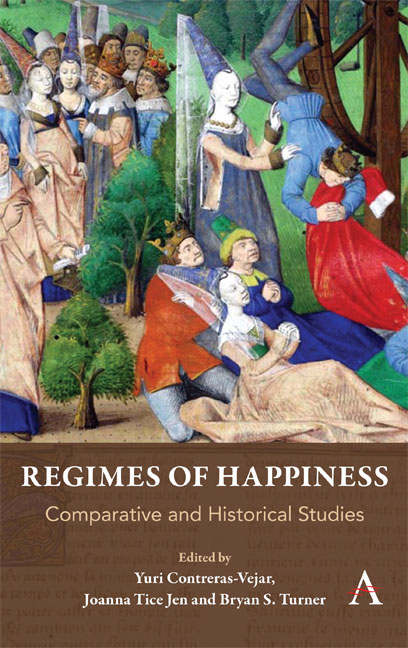Book contents
- Frontmatter
- Contents
- Acknowledgements
- Notes on Contributors
- Introduction: Reflections on Regimes of Happiness
- Part I Happiness in the West
- Chapter One A Fragment of Bliss: Augustinian Beatitudo and the Ideal of Atonement
- Chapter Two Arts of Happiness and Love: Translating Aristotle in the Later Middle Ages
- Chapter Three Spiritual Transcendence as the Path to Happiness in a Selection of Old French Texts
- Chapter Four On Machiavelli, St. Francis and the Pursuit of Happiness
- Chapter Five Their Idea of Happiness Prevents Easy Categorization of Scottish Enlightenment Philosophers
- Chapter Six A Path to Eternal Happiness: Convent Life in the United States in the Nineteenth Century
- Chapter Seven “Be Joyful Always!”: Twenty-First-Century Evangelical Conceptions of Happiness and Trumpist Politics
- Chapter Eight The Erasmus Program: The Promise of European Happiness
- Chapter Nine Innovations in the Psychological Study of Happiness: From Mirror Neurons to Mobile Technology
- Part II Comparative Perspectives
- Index
Chapter One - A Fragment of Bliss: Augustinian Beatitudo and the Ideal of Atonement
from Part I - Happiness in the West
Published online by Cambridge University Press: 29 May 2019
- Frontmatter
- Contents
- Acknowledgements
- Notes on Contributors
- Introduction: Reflections on Regimes of Happiness
- Part I Happiness in the West
- Chapter One A Fragment of Bliss: Augustinian Beatitudo and the Ideal of Atonement
- Chapter Two Arts of Happiness and Love: Translating Aristotle in the Later Middle Ages
- Chapter Three Spiritual Transcendence as the Path to Happiness in a Selection of Old French Texts
- Chapter Four On Machiavelli, St. Francis and the Pursuit of Happiness
- Chapter Five Their Idea of Happiness Prevents Easy Categorization of Scottish Enlightenment Philosophers
- Chapter Six A Path to Eternal Happiness: Convent Life in the United States in the Nineteenth Century
- Chapter Seven “Be Joyful Always!”: Twenty-First-Century Evangelical Conceptions of Happiness and Trumpist Politics
- Chapter Eight The Erasmus Program: The Promise of European Happiness
- Chapter Nine Innovations in the Psychological Study of Happiness: From Mirror Neurons to Mobile Technology
- Part II Comparative Perspectives
- Index
Summary
Introduction
The notion “regimes of happiness” is an attempt to capture and define the elusive nature of the intersections of ideas and ethical ideals. Regimes of happiness define the ideals and notions of human fulfillment found in different societies. As normative social configurations, they define and regulate what is desirable, acceptable and permissible. These dimensions can be organized into three domains: pleasure, meaning and force. Regimes of happiness constrain and regulate human pleasure, establish ontologies of truth and set standards and limits on violence; they structure and organize these three domains through the articulation of symbols, discourses, rituals and institutions. Instantiations of these domains are sexual practices, hermeneutic keys and the organization of the means of violence. In the following pages, I will expound the main contours of a particular, though crucial, regime of happiness in the history of Latin European societies: Saint Augustine's beatitudo.
As an artful orator, Saint Augustine created his own vocabulary to talk about a happy life. Augustinian beatitudo embodied a vision of human fulfillment based on withdrawal from the world, sexual abstinence, ascetic rigor and rejection of the earthly pleasures. As a regime of happiness, beatitudo served as a sociohistorical configuration that cemented and consolidated the rise of Christianity as a thanatology. Christian religion articulated fundamental religious symbols that helped to cope with grief and sorrow in the face of death. The hope of salvation— being saved from physical and spiritual oblivion— was essential to the Gospels. Augustinian vision of human fulfillment rearticulated this thanatological dimension of the Christian narratives of redemption. Once Augustinianism became dominant, the monastery as an institutionalization of withdrawal from this world became the fundamental organization of Latin Europe. Certainly, Augustinian beatitudo was not the only regime of happiness within the confines of the Latin West— indeed, there were conflicting and antagonistic regimes; however, Augustinian Christianity became dominant by the end of the fourth century CE, and its hegemony lasted for a millennium. In many ways, the history of the ideals of happiness in Western societies is the story of the ideal of beatitudo, its rise, crises and decay.
- Type
- Chapter
- Information
- Regimes of HappinessComparative and Historical Studies, pp. 11 - 24Publisher: Anthem PressPrint publication year: 2019

